If you haven’t already developed a local SEO strategy for your business, there’s a good chance your competitors are getting some of the leads and sales you need to grow. For companies that offer goods and services to people nearby, much of the battle for their business is won or lost online.
Google surveyed more than 5,000 smartphone users and found the following:
- 4 in 5 consumers use search engines to look for local information like store addresses, business hours, in-stock products, and driving directions. When they want something, they look online first.
- Half of the consumers who conducted a local search visited a store within a day. If they find your business in the top results, they go there soon.
- 18% of the time, a local search led to that consumer purchasing within 24 hours. When your business dominates local SEO, more people buy.
- 4 out of 5 consumers say they prefer ads customized to their location, and more than 60 percent say they’ve used store addresses, phone numbers, and call buttons to follow up. If they can’t find you online, they probably won’t try to find your physical location.
What is Local SEO?
SEO is search engine optimization, a process that makes your business more visible to people when they search for you online. Local SEO utilizes purposeful tactics to attract consumers nearby.
Both SEO and local SEO have the goal of getting you more website traffic, sales leads, and revenue from online sources, but they use different processes and methods. SEO appeals to the entire world, and your competition is global. Local SEO allows you to narrow your focus to just the people nearby. The main difference is intent – Local SEO targets people who want to either drive to your business and spend money there right now, or do business with a local company.
Optimizing means making something as good as it can be. Local SEO, however, involves tweaking every aspect of your website and other digital marketing to help search engines connect you with local people searching for products or services near them.
Why is Local SEO Important?
With local SEO, the competition isn’t worldwide; it’s geo-specific within your community. It’s easier to be the big fish when the pond isn’t the size of an ocean. You’re only competing with other small businesses near your location, so you have better visibility and a higher chance of searchers finding you.
For many searches, people only want nearby relevant results. When they’re looking for a dentist, oil change, or moving van, they’re only interested in businesses within driving distance. That means your business doesn’t have to have a stronger online presence than everyone else in the industry; you have to help search engines understand where you are and what you do in your area. Local SEO enables your business to appear at or near the top when people search, making it easier for potential customers to find you.
Online searchers have cash in hand and are looking for a place to spend it. They’ve gotten used to search engines automatically providing results based on their location, especially when searching from their phones. But unless you make local SEO part of your online marketing strategy, search engines won’t necessarily know when your business should show up in local results.
How to Do Local SEO
Not having a local SEO strategy in place guarantees your business misses out on potential new customers and revenue. Having one ensures your local SEO rankings improve while growing your business online. Let’s look at the basics of how to optimize your SEO.
Claim Your Google my Business
You may have noticed while searching online that most prime screen real estate is taken up with Google ads. Below that, if the search has local intent, you typically see a Google map with three local results (known as Google map pack or Google local 3-pack), followed by organic results. Yet often, a significant portion of the right part of your screen displays a large box with info on a local business. From there, searchers can see when you’re open, get directions to your business, click to call you or visit your website.
Much of that information comes from a fully optimized Google My Business account. It’s currently free, and it helps customers discover your business, it also helps encourage customer reviews and provides valuable consumer insights.
If you haven’t already, claim your Google My Business listing and make it as detailed and complete as possible. Or reach out to us at Stoodeo and we can optimize that for you.
Get Local Reviews
Potential customers read and evaluate reviews as part of their buying decision. Google knows this, so it factors user reviews into your local SEO rankings. On average, 90 percent of customers read fewer than ten reviews, then decide whether or not a business is trustworthy.
Positive online reviews generate income. Consumers spend 31% more at a business that has excellent reviews. And when people read about you on their smartphones, they’re 127% more likely to purchase than someone searching on a desktop. At Stoodeo, we can help you develop a local SEO strategy that involves getting more online reviews.
Local SEO Website Optimization
Search engines evaluate your business website to decipher your business location and what you offer or sell. Work with a 5-star web design agency to make sure your business stands out with local SEO tips like these:
- Ensure NAP consistency – Make sure the business name, physical address, and phone number on your website exactly match other online sources. You should have the same name, address, and phone number on your website, Google My Business Listing, Chamber of Commerce and Better Business Bureau profile pages, and everywhere else your business appears online.
- Optimize for mobile – Mobile optimization means your website is easy to use and provides a great experience no matter what type of device people use to view it.
- Focus keyword research on local SEO – You can help customers find you by knowing what words they use to search. Google Ads Keyword Planner lets you filter keyword searches to a given region. Once you know what to focus on, use those keywords in page titles, headings, body text, URLs, and meta descriptions.
How to Improve Local SEO
Local SEO is an ongoing process. Google determines local ranking based on relevance, distance, and prominence. Once you start to see positive movement, there’s more you can do to improve upon your SEO rankings.
- Get local SEO citations – A citation is simply a mention of your business online. Consumers turn to local directories like Yelp, Angie’s List, and TripAdvisor to find more information and reviews. Positively impact your Google rankings by ensuring the information they find is complete and accurate.
- Optimize for voice search – Voice technology makes it easy to search on the go. When they talk to Siri, Alexa, or Google, they use more natural language. Research long-tail keywords and optimize pages, so when people search for you vocally, they find you locally.
- Create separate pages for multiple locations – If you serve customers in more than one area, each one should have a page. Include individual store hours, that store’s name, address and phone number, customer testimonials, and promotions that are unique to that location.
- Create local content – Prominence is how well-known your business is, and part of that is based on information Google gathers from across the web and your position in web results. When you create local content, it improves your chances of better local ranking.
Examples of Local SEO
You’ll find examples when you check out our work. Stoodeo’s client Heritage Land Improvements develops ranches and other rural property throughout much of Texas. They cover a wide area, but they aren’t in competition with businesses offering the same types of service in other states. Local SEO targets potential customers who need their services within their service area. So we created location-specific pages for each of their target locations, with a breakdown of the services landowners can find in each.
JEH Construction is a master at metal building construction in East Tennessee. In their website design, we included their service area in all the right places. Their About page has the long-tail keyword “East Tennessee based construction company,” lists main cities, and attributes a location to each client testimonial. Their contact page includes a map displaying their location. On their services page, each heading reinforces their East Tennessee location.
Benefits of Local SEO
Implementing this focused SEO strategy helps your business develop an influential online presence in your area. People searching for local products and services will be more likely to spend money at your company.
More local online traffic means more traffic overall, which is beneficial for your overall SEO. It’s easier for local people to call you or get driving directions, now they’re more likely to do it on the go because they’ve discovered you.
You make more money. Your business grows faster. Consumers feel confident about buying and interacting with you online. They become repeat traffic.
Tips for Local SEO
Once you start to experience the benefits of local SEO, you’re going to want to keep that forward momentum. These tips for local SEO will help.
- Create multiple location-specific landing pages. Consider one for your city and one that’s state or region-specific.
- Personalize specials and discounts for local shoppers. Use Google Ads to offer discounts just for area residents and watch your click-through rates and SEO skyrocket.
- Host events and promote them online. Don’t just post your cookoff, festival, workshop or charity event on Facebook, put it on your website as well.
- Write blog posts to announce new locations or location-specific celebrations.
- Include locations when you post client testimonials.
Local SEO Service Company & SEO Consultants
You might be wondering where you’re going to fit this into your already packed schedule, but failing to take action will cost your business. When you hire the right local SEO service company or SEO consultants, their services pay for themselves many times over in terms of traffic and increased revenue.
9 Best Local SEO Tools
There’s a lot involved, but the right technology makes the job easier and ensures you’re using the most accurate and up-to-date information. These SEO tools give you the resources to improve your local search rankings. Here are nine of our favorites:
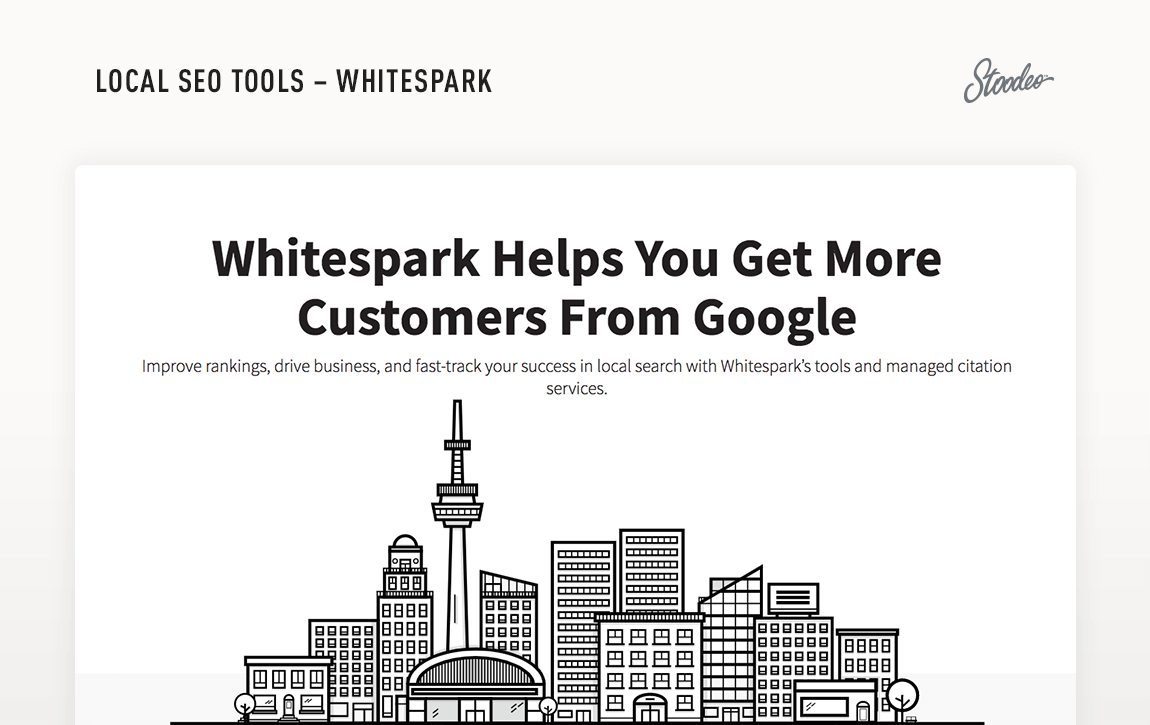
Whitespark, Local citation finder – Best citation opportunities for your business.
1 Whitespark
Whitespark is a local SEO tool that helps you get more customers from Google. Its Local Citation Finder helps you research competitor citations so you know where you need to improve your own. The Reputation Builder encourages customer feedback, testimonials, and reviews. Whitespark’s Local Rank Tracker helps you track local SEO rankings on search engines like Google and Bing.
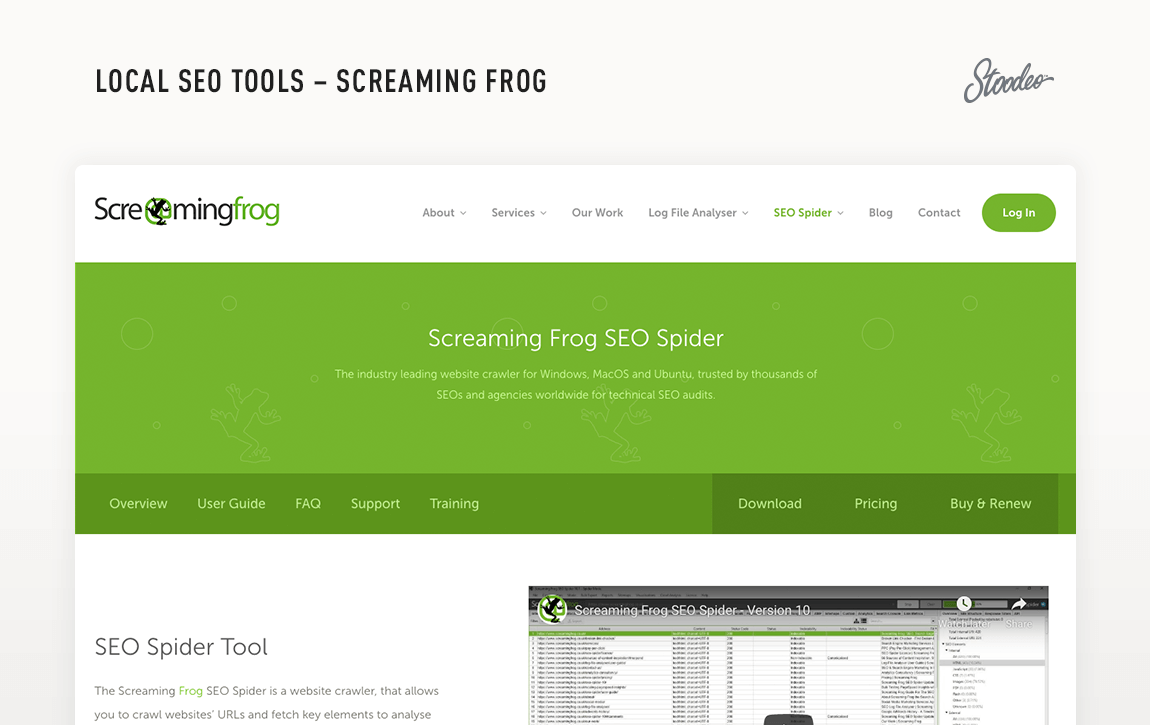
Screaming Frog SEO Spider is an SEO auditing tool, built by real SEOs with thousands of users worldwide.
2 Screaming Frog
Your business can use the same tool top local SEO agencies use to analyze your website and make sure it’s optimized for local search. The Screaming Frog SEO Spider tool helps find broken links, analyze page titles and metadata, discover duplicate content, and more.
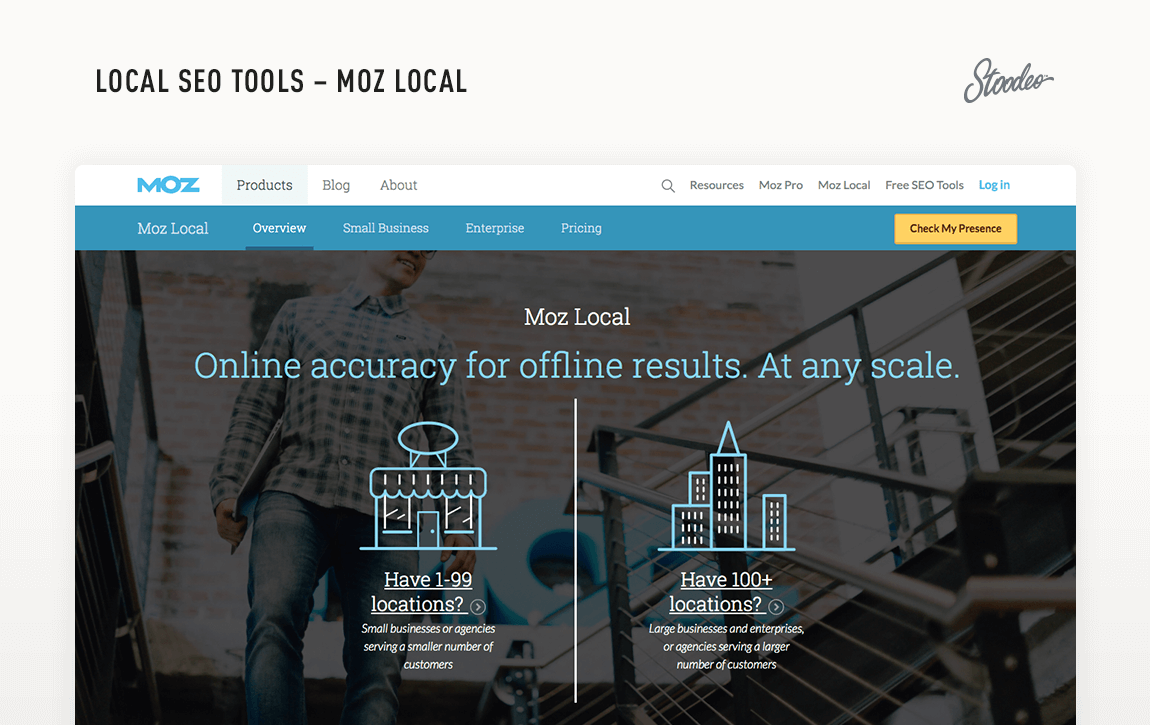
Moz Local helps small business get the most out of their online presence.
3 Moz Local
Accurate location data is critical to local SEO. Moz Local helps businesses of every size manage their location data so search engines and customers can find them. Moz Local also offers local SEO tools for cleansing inaccurate data, managing reviews, social posting, Google and Facebook integration, and store location.
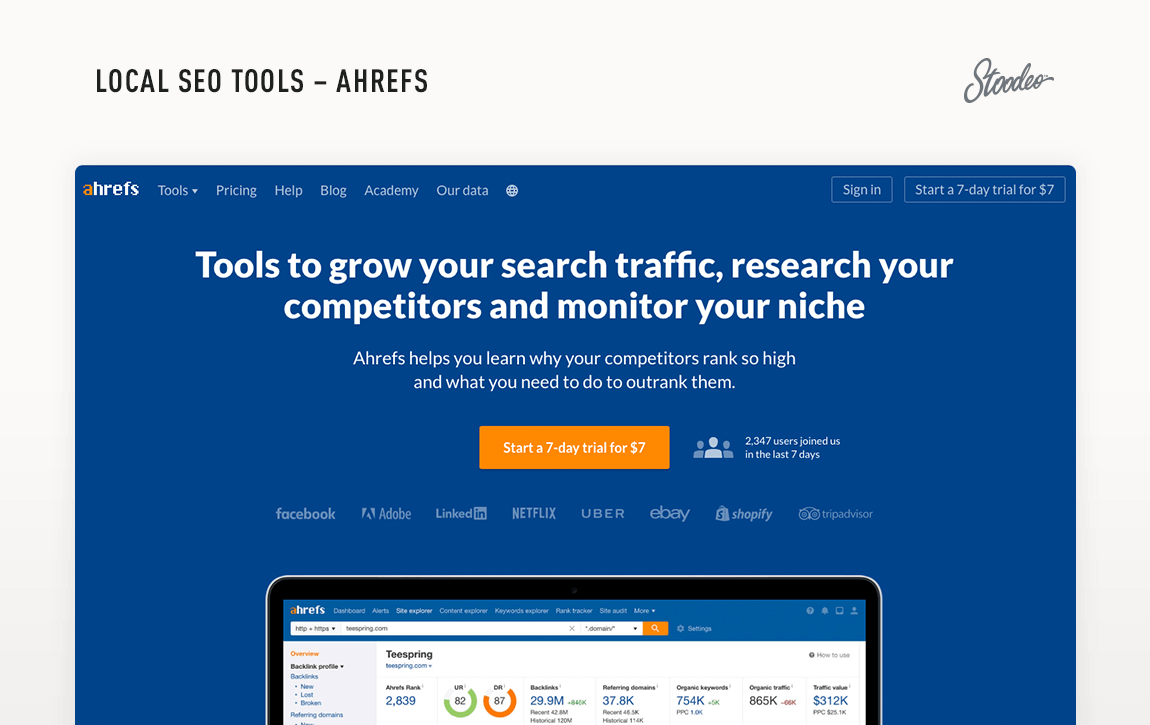
Ahrefs helps you learn why your competitors rank so high and what you need to do to outrank them.
4 Ahrefs
If you want to win at local SEO, you have to be better than the competition. Ahrefs helps you research your competitors and niche so you can do just that. They regularly release new features, with local SEO tools for competitive analysis, backlink and content research, web monitoring, and rank tracking.
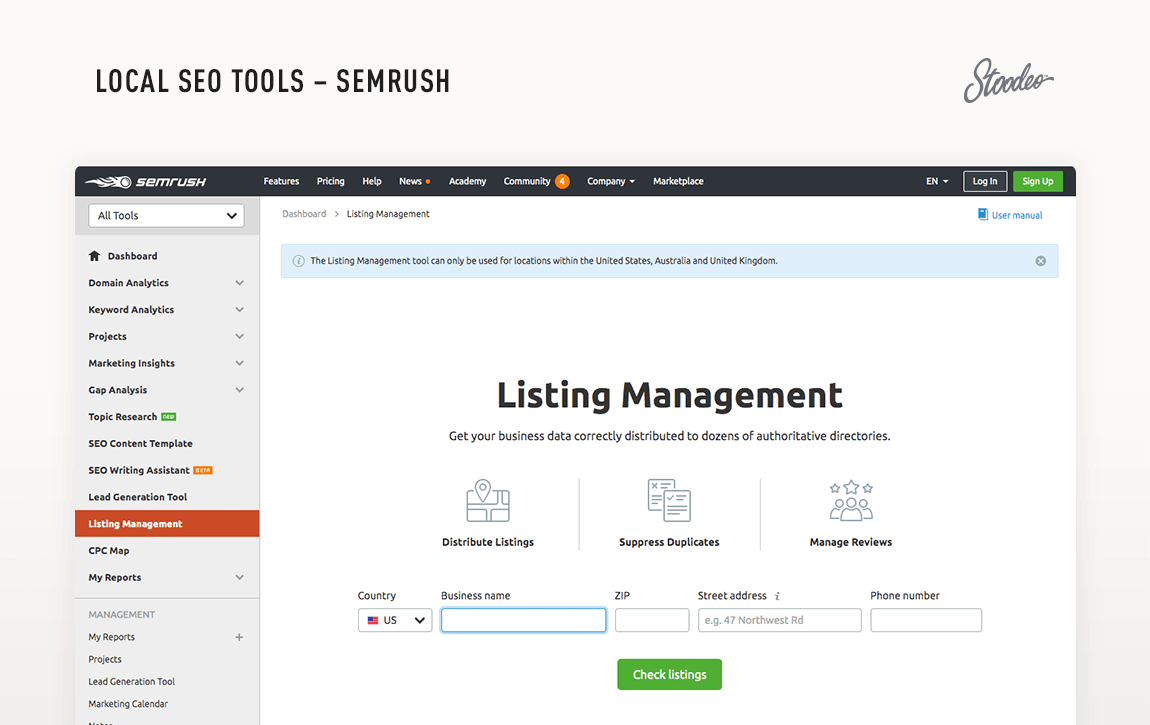
Get your business data correctly distributed to dozens of authoritative directories.
5 Listing Management by SEMrush
You don’t have time to individually monitor your business listings and reviews everywhere they exist online. SEMrush’s Listing Management tool lets you see listings, reviews, and local pages on one dashboard for Facebook, Amazon Alexa, Foursquare, Apple Maps, Yahoo, and many other sources. From one central location, you can enter basic business info, check your listings, distribute the correct data, suppress duplicates, and manage reviews.
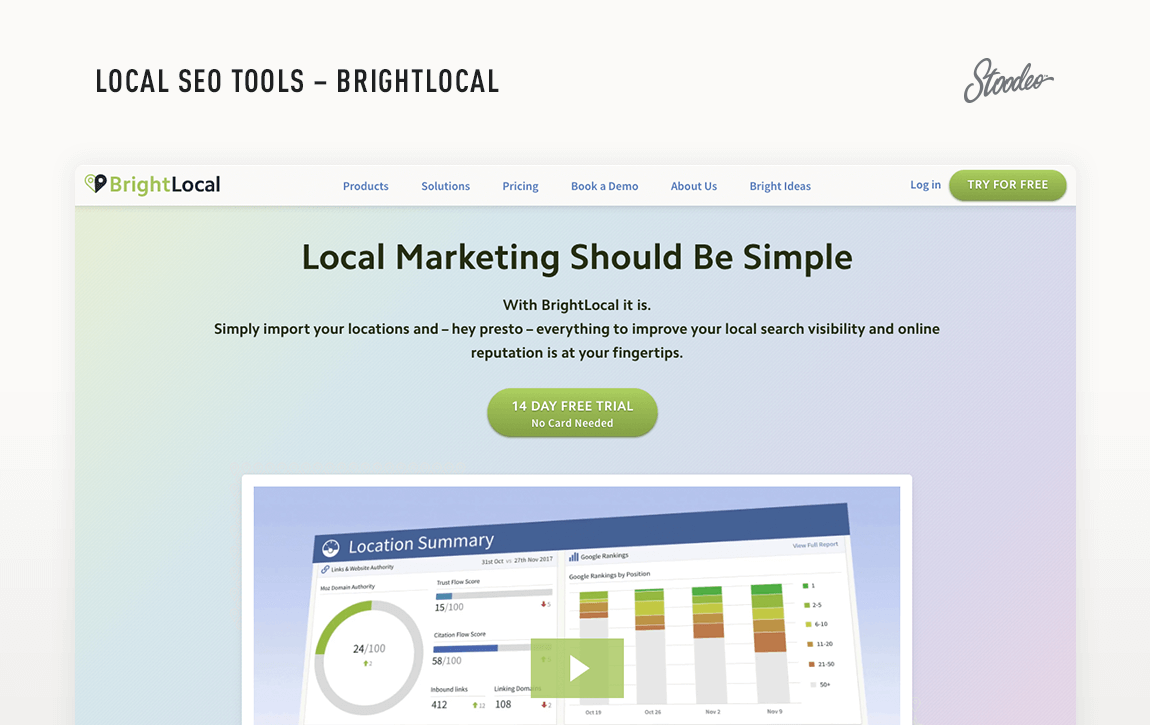
Boost search visibility with business listings management on thousands of sites.
6 BrightLocal
Brightlocal has a treasure trove of local SEO tools to help you identify your most significant optimization opportunities. Audit existing citations for NAP consistency. Track keyword performance on Google, Yahoo, and Bing. Manage reviews on all the most commonly used sites and create reports that are easy to understand and yield actionable insights.
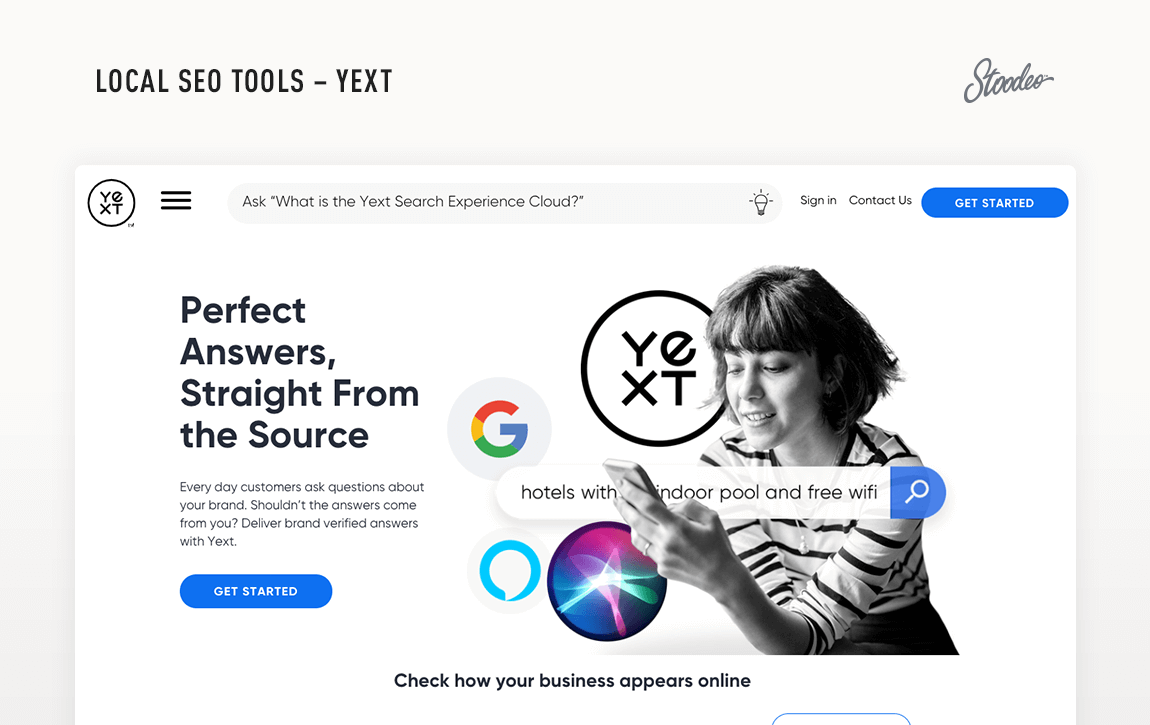
Yext Listings puts you in control of the facts about your business across 150+ digital services globally.
7 Yext
Yext lets you scan to see all the places your business is listed online. From there, you can see where listings are missing, in need of verification, or contain incorrect information. Fix all the errors at once, then use their local SEO tools to improve brand awareness and draw consumers to your website and retail location.
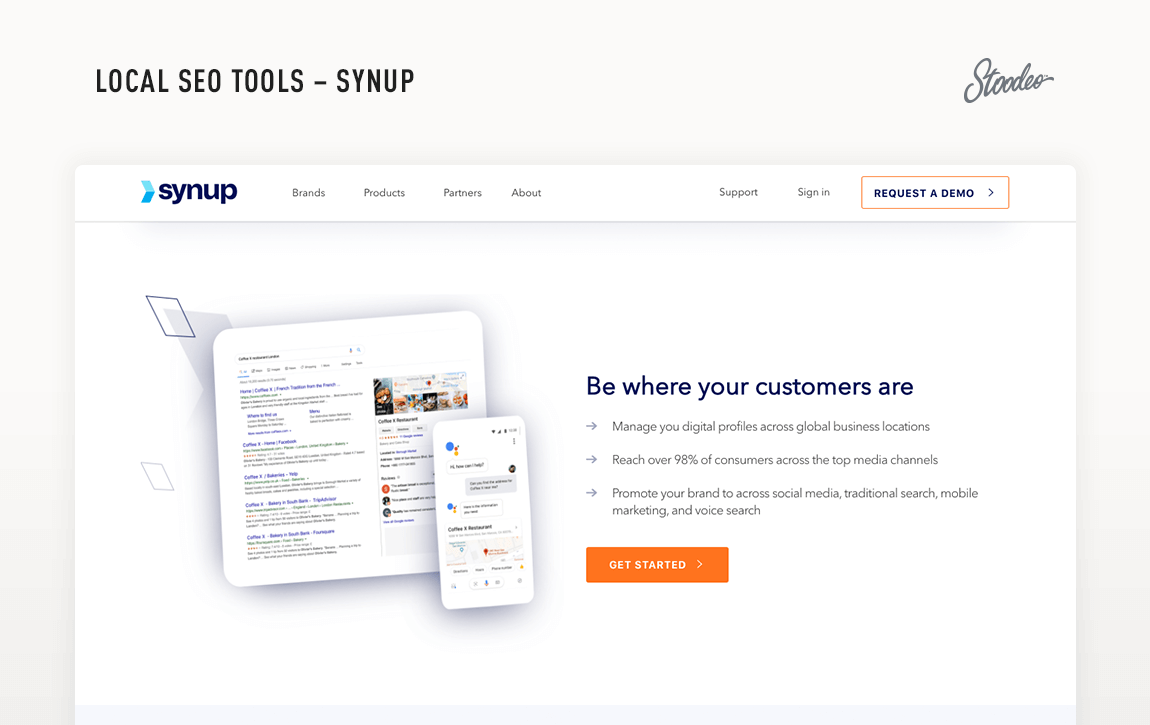
Synup makes it easy for multi-location brands to attract new customers.
8 Synup
Synup offers powerful local SEO software that crawls more than 200 local search engines and directories to make sure your location data is accurate in every single one. When customers leave reviews or make a comment on social media about your business, you immediately receive an alert and can reply from within the tool. Deliver content like hours, menus, promotions, and videos to all media and all devices so you can reach new customers and build relationships with existing ones.
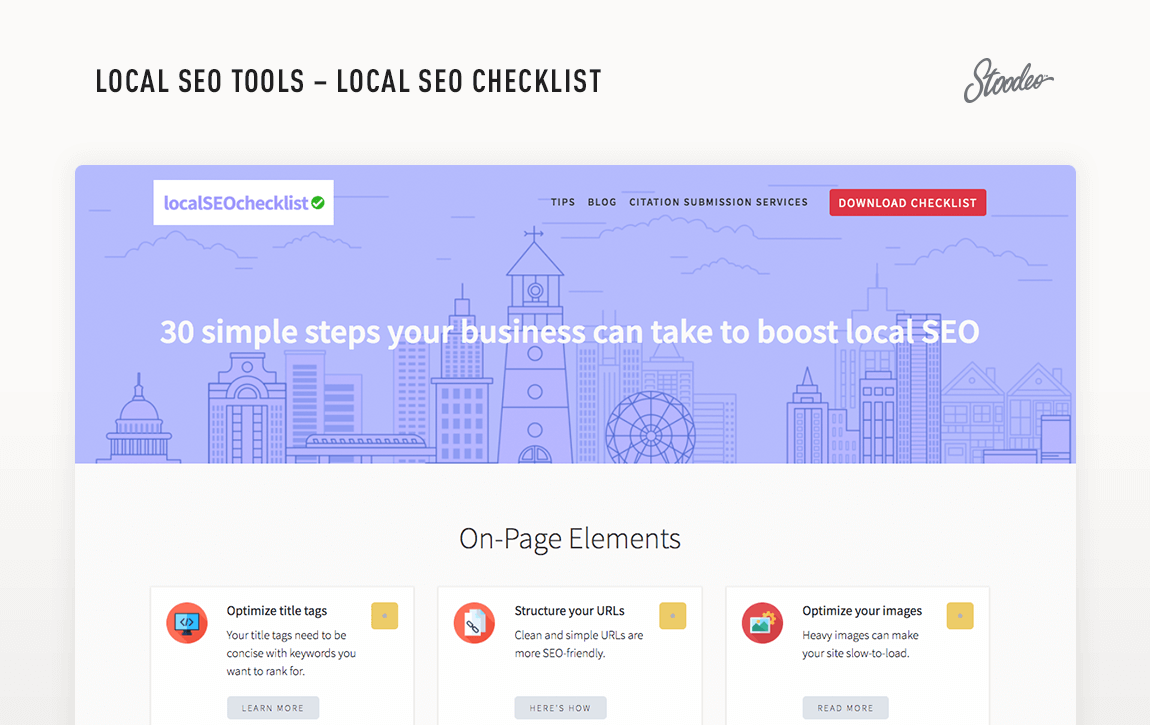
0 simple steps your business can take to boost local SEO.
9 Local SEO Checklist
If you’re a do-it-yourselfer or the cost of local SEO tools isn’t in the budget, Local SEO Checklist is a free tool that provides 30 steps to improving your business’s local SEO. The website offers information on tasks like optimizing title tags and images, using structured data markup, selecting your Google business category, and claiming listings on major directories.
Best Way to Improve Local SEO
You don’t need another lengthy to-do list or a complicated marketing strategy that doesn’t grow your business. At Stoodeo, we recently received recognition for being a top web design and SEO company because we create affordable web designs that yield results. Let’s get started on your local SEO strategy when you contact us online today.

